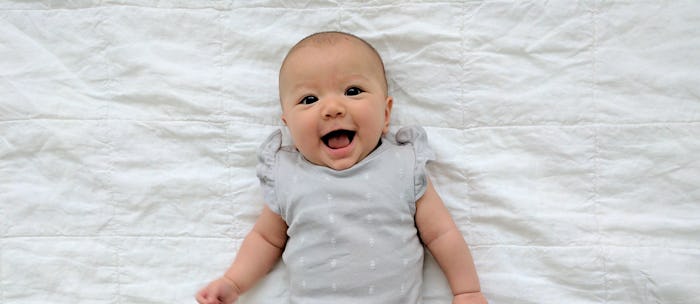Life

The Reason Why Babies Smile At You Will Seriously Make You Smile
Whether you're currently the recipient of your own baby's sweet smiles or you just seem to be a magnet for baby grins in general, you might find yourself wondering why babies are always smiling at you. Sure, you could be a 'smile whisperer' but science has another explanation for this adorable phenomenon. Babies are surprisingly skilled at busting out a smile at just the right time, and actually have a pretty cool reason for doing so.
A 2015 study conducted by the University of California, San Diego, and published in the medical journal PLOS One, looked at why babies, ages 4 to 17 weeks, smile when they do and what the purpose of those smiles are. The findings are fascinating: Infants smile to make their caretakers smile. "The results indicate that by 4 months of age infants interact with their mothers in a goal-oriented manner, utilizing a sophisticated understanding of timing in social interactions," PLOS One explained.
So if you ever feel like your baby has you wrapped around his or her little finger, it turns out they actually kind of do. Babies are master manipulators. "In our study, mothers consistently attempted to maximize the time spent in mutual smiling, while infants tried to maximize mother-only smile time," the study explained. Basically, babies want you to smile as much as possible while they smile as little as possible.
But how exactly do infants achieve maximum "mother-only" smile time? These mini-masterminds use "maximally efficient wait times" between smiles, according to the study. Somehow these pint-sized geniuses know that if they stop smiling entirely, their caretaker will stop smiling, too, but if they space out their smiles correctly, they'll keep their caretaker smiling all day long! Pretty impressive stuff, right?
Babies might be experts at getting us to smile, but what do they gain from it? Seeing our smiley faces might be a way for babies to understand the emotions that lie behind a smile. "I really think that babies are learning what joy is by sharing it with someone else," Daniel Messinger, a professor of psychology at the University of Miami, said in an interview with Slate.
By the time your baby reaches 9 months, they're definitely smiling because they feel joy. Watch any 9-month-old interact with his or her favorite toy and it's clear they're truly delighted. But it turns out even 9-month-old smiles can have a deeper meaning. If your 9-month-old baby smiles at a toy, let's a say it's a teddy bear, and then holds that smile while looking at you or another social partner, it is called "anticipatory smiling," according to a 2009 study, published in the science journal Infant Behavior and Development, that investigated that very topic.
It seems anticipatory smiling is a pretty advanced social skill. Your baby not only feels happy about his teddy bear, but he wants to share that happiness with you. "There's growing evidence that these anticipatory smiles are a crucial moment in infant development—the moment when babies begin to be aware of their social world. They mark a new and unique cognitive step: sharing an emotion with someone else that's about some third thing," explained Slate.
What's even more interesting is that Infant Behavior and Development study found that anticipatory smiling at 9 months, "positively predicted parent-rated social competence scores at 30 months.' So if you see your 9-month-old participating in a lot of anticipatory smiling, it's a really promising sign that they're going to be well-adjusted socially when they get older.
When you step back and think about it, it's remarkable how much babies understand and communicate at such an early age. They're truly little smiling geniuses.